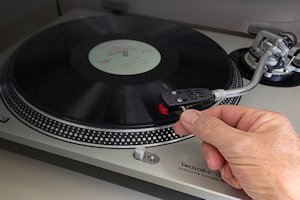Why Music is Better Than It's Ever Been Right Now
 | | This was the technological equivalent of an iPod fifty years ago |
These last fifty years have seen a huge amount change in the music industry. Whether it was the initial launch and popularization of Vinyl Records and CDs in the late twenty-first century or the steadily increasing popularity of iTunes and other music services like Spotify recently, saying that the music hasn't changed is very ignorant. However, what isn't ignorant is asking whether this change has been for the better. Having such a significant amount of change naturally begs the question: has the change in music over the past ten to fifteen years been for the better, or the worse?
Music Has Changed for the Better
When looking at the evolution of music through time, it is true that much of what used to be popular simply isn't that popular anymore. An analysis conducted by a team of scientists at the University of London of the U.S Billboard Hot 100 hits (a weekly ranking of the top songs in the country) between 1960, and 2010 showed a steady rise and decline of different genres over the years. The study revealed that hip-hop is one of the primary beneficiaries of increased popularity through the late 1990's and early 2000's while other older genres like jazz and classic rock have seen a steady decline in the number of top hits. While this trend demonstrates that the public's music tastes changed over the years, one of the reasons why this isn't a negative trend is very simply because music is more accessible than ever.
 | | Spotify: democratizing music |
Even though some critics argue that music of this generation is distasteful and not as pristine as that of before, the argument is invalid mainly because in today's day and age all type of music is available. With universal and accessible services like iTunes or Spotify offering thousands of different genres, finding the kind of music you prefer is much easier than it was in the past. The rise of the Internet this generation has provided music lovers with the ability to find what they love with as few clicks as possible. For instance, over 100 million Spotify users can enjoy 1,371 different genres of music ranging from obscure to mainstream genres.
This unprecedented access to various kinds of music has made music better than it has ever been in the past. There’s a chance streaming services could be the only way we consume music moving forward. Take Chance the Rapper for example, as he received seven Grammy nominations this year while his mixtape Coloring Book was only available to listen on streaming services. In retrospect, the second highest Grammy nominated hip-hop artist did not have a physical album out, instead electing to stream a mixtape.
 | | You don't even need a garage anymore |
Another benefit of music today is the ability to be heard. Nowadays, any potential musician can gauge interest and launch a career in minutes. A combination of cheap and affordable music equipment coupled with music services like Soundcloud that allow artists to share music quickly has led many musical careers that would not have been possible in the past. The ability to share music easily has also substantially decreased the importance of profit sucking record labels which have a history of creating conflicts in artists’ careers.
Soundcloud itself has partnered with over 20,000 independent or indie record labels that operate without outside funding, allowing many artists to pursue their musical careers without the stress of having a record label. Overall, having cheap and widespread musical equipment available combined with services like Soundcloud has made this generation of music better than it has ever been.
-Jason Peter, 1/30/2017
ENLIGHTENED MINDS is a guest blog for emagill.com. If you'd like to contribute your own essay, shoot me an email at emagill00@hotmail.com. I can't promise to post everything that is submitted, but I will definitely read whatever you have to say and get back to you as quickly as I can. This is a solo operation, though, so patience is recommended.
|